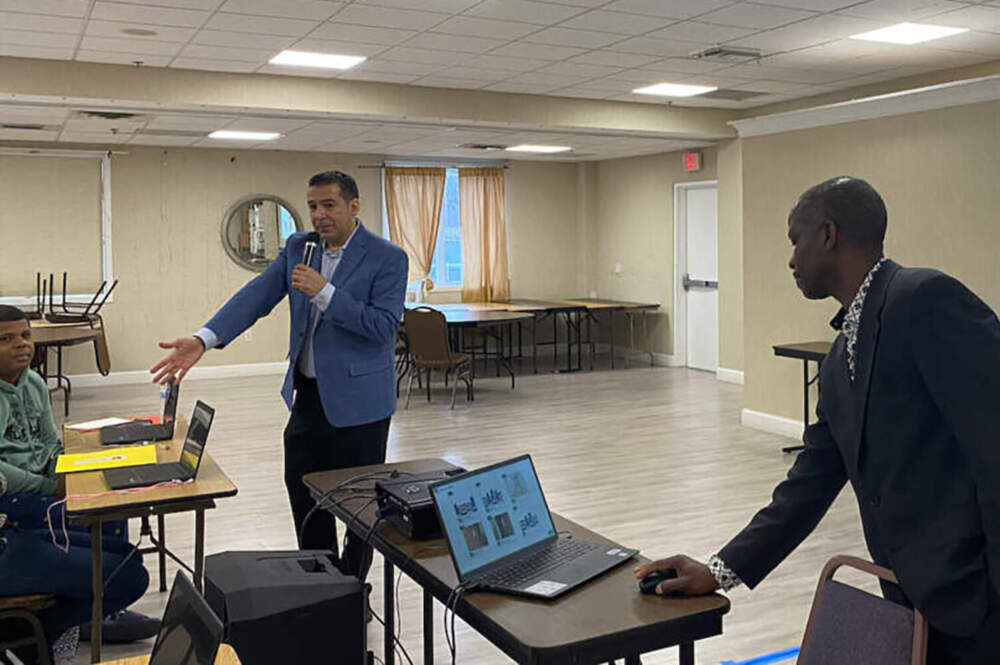Advertisement
With shelter deadlines looming, English classes prepare residents for 'self-sufficiency'
Resume
On a recent afternoon at a former hotel in Methuen, about 20 Haitian students sat in a makeshift classroom, practicing words in English related to school and workplaces, led by a teacher and a Haitian Creole interpreter.
“Office,” the students repeated. “Computer lab … Library … Classroom.”
About half of the 7,500 families in the state’s emergency shelters are immigrants, and many of them say that without English, it’s more difficult to find work. That’s why the state is running an English Works program, a pilot effort to bring basic English-as-a-second-language classes to the shelters. It's a program that could become standard across the state’s emergency shelter system.
Lourdia Beauvoir belongs to one of the 75 families staying at the Methuen shelter.
“I'm learning English because I want to communicate when I get a job, to communicate to co-workers and supervisors,” she said in Haitian Creole, speaking through an interpreter. “And even for my kids, when they go to school, I have to speak for them.”
English skills are a game changer for many immigrants. A study from 2014 found that those who have limited English earn 25-40% less than those who speak proficiently. More English speakers also means more tax revenue for governments due to higher earnings by the workers, and greater acceptance of immigrants by the general public.
“From employers, we hear that if a worker is going to do well in the workplace, they need to be able to speak and to read and write in English,” said Ronnie Millar of the Massachusetts Office of Refugees and Immigrants, who oversees the program.
The goal is to get students to a level where they will be able to secure interviews and land a job, Millar said. And a job is key to affording housing outside of the shelter.
The need for English classes was heightened when Gov. Maura Healey signed a measure to put a nine-month cap on the duration of emergency shelter stays.
The classes are run by the nonprofit English for New Bostonians in 11 shelters around the region. Claudia Green, head of the nonprofit, said the program is an effort to chip away at a huge waitlist for state-funded English classes that extends well beyond shelters; some 20,000 people are in line overall.
“There's not the capacity to accommodate such a huge influx of people at this time,” Green said. “And so we had to get creative as to how we were going to serve this population that are living in the hotels and motels.”
The current solution is a hybrid of in-person and online learning, with a focus on workplace terminology. After attending weekly classes in the shelters, students can continue making progress using their phones.
While staff members lead classes, Green said volunteers help out with everything from technology to childcare. That means a lot, she added, considering the heated climate around immigration.
“We've seen protests around the state — and there's going to be 'antis' everywhere — but there are way more people across the commonwealth that have been so willing to step up and help,” she said.
Massachusetts awarded English for New Bostonians a $427,000 contract for the 12-week pilot program. That’s a tiny fraction of the hundreds of millions the state is spending annually on emergency shelters and support for new immigrants.
Even some who are critical of the state’s spending embrace the idea of English classes. State Sen. Peter Durant, a Spencer Republican, said the immigrants are likely here to stay, so the state should help them assimilate into the broader society.
“That means some job training, where it makes sense, and ESL classes,” Durant said. “We want people to learn the language, and quite frankly, move them out of the shelters, try to get them to be self-sufficient.”

After her English class at the shelter in Methuen, 33-year old Daphne Joseph Michelle said she’s yearning to learn the language of her new country. She looks forward to the day when she no longer needs an interpreter.
“I don't feel good because I want to speak,” she said. “I feel boring and different.”
She feels "boring," she explained, because she can’t contribute to conversations, and "different" because she feels she doesn’t belong.
“I live in this country — this is the language that they speak. I have to speak like them to communicate with them,” she said in Haitian Creole.
The English pilot program is set to expire in June. Advocates hope classes will ultimately be offered at all of the state’s emergency shelters. That will depend on whether policymakers are willing to set aside more money for the initiative.
The state has put out a request for proposals to continue English language classes in the months ahead.
This segment aired on May 20, 2024.
